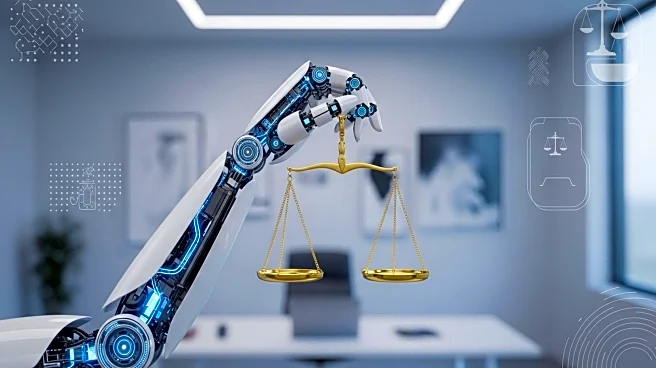What's Happening?
The integration of artificial intelligence (AI) into the legal profession is reshaping the roles and operations of general counsels (GCs). AI is not only enhancing productivity and cost efficiency but is also redefining the strategic role of legal departments. The technology is enabling GCs to preserve and operationalize institutional knowledge, thereby reducing the risk associated with the departure of key legal personnel. AI tools are creating a dynamic corporate intelligence that captures the reasoning behind legal decisions, which helps in maintaining continuity and strategic coherence within legal teams. This transformation is also influencing the lateral talent market, as law firms can now retain institutional knowledge even when individual lawyers leave, potentially altering the dynamics of client-lawyer relationships.
Why It's Important?
The adoption of AI in legal departments is significant as it positions GCs as strategic leaders rather than mere consumers of legal services. By embedding institutional knowledge within AI systems, legal teams can maintain operational excellence and strategic coherence, even as organizational complexity increases. This shift could lead to a more efficient legal services market, with GCs playing a pivotal role in determining which law firms thrive. The transformation also suggests a move away from the traditional billable hour model towards value billing, driven by increased efficiency and AI-enabled insights. As AI continues to evolve, it will likely redefine the competitive landscape of the legal profession, emphasizing the importance of human judgment and strategic decision-making.
What's Next?
As AI capabilities advance, legal departments will need to engage with these technologies to remain competitive. GCs are expected to lead this transformation by integrating AI into their strategic planning and operations. The legal services market may see a realignment, with GCs influencing the success of law firms based on their ability to adapt to AI-driven efficiencies. Additionally, the role of GCs will expand as they become active market makers in legal services and technology, shaping the future of the profession. The ongoing transformation presents an opportunity for legal departments to redefine their value proposition and strategic influence within their organizations.
Beyond the Headlines
The integration of AI into legal operations raises ethical and accountability questions, particularly regarding the boundaries between machine-driven insights and human legal judgment. As AI systems become more sophisticated, the legal profession will need to address these challenges to ensure that AI complements rather than replaces human expertise. The cultural shift towards AI adoption will require GCs to foster an environment that embraces technological change while maintaining the core values of the legal profession.









